 ALADDIN An imprint of Simon & Schuster Childrens Publishing Division 1230 Avenue of the Americas, New York, NY 10020 Copyright 2009 by David Colbert Thanks to John Chew for his mathematical expertise All illustrations, woodcuts, and photographs courtesy of the Library of Congress All rights reserved, including the right of reproduction in whole or in part in any form. ALADDIN and related logo are registered trademarks of Simon & Schuster, Inc.
ALADDIN An imprint of Simon & Schuster Childrens Publishing Division 1230 Avenue of the Americas, New York, NY 10020 Copyright 2009 by David Colbert Thanks to John Chew for his mathematical expertise All illustrations, woodcuts, and photographs courtesy of the Library of Congress All rights reserved, including the right of reproduction in whole or in part in any form. ALADDIN and related logo are registered trademarks of Simon & Schuster, Inc.
Library of Congress Control Number 2008937174
ISBN-13: 978-1-4169-9893-8
ISBN-10: 1-4169-9893-4
Visit us on the Web:
http://www.SimonandSchuster.com
CONTENTS

Denounced as unpatriotic for his belief in democracy, then nominated for high office almost as an afterthought, Lincoln became the countrys most admired president.

DAY 1:
OCTOBER 5, 1818
ALONE
A childhood tragedy makes Lincoln wonder about leaving his mark on the world.

DAY 2:
JANUARY 12, 1848
UNPOPULAR VOICE
Lincoln sacrifices his first national office to speak out against a war and a president.

DAY 3:
NOVEMBER 2, 1858
THE GOOD FIGHT
Lincoln debates Senator Stephen A. Douglas about the extension of slavery into the American West.

DAY 4:
MAY 18, 1860
SURPRISE CANDIDATE
Ranked fourth out of four, Lincoln shocks the favorites and becomes the nominee for president.

DAY 5:
APRIL 18, 1861
TREASON
The government of South Carolina attacks U.S. troops it has kept trapped in an island fort.

DAY 6:
JULY 21, 1861
DEFEAT
The first battle of the war ends in a disaster for the Union and puts Lincoln in a difficult position.

DAY 7:
SEPTEMBER 22, 1862
EMANCIPATION
Ignoring political advice and resistance, Lincoln takes steps to abolish slavery himself.

DAY 8:
NOVEMBER 19, 1863
SHALL NOT PERISH
Lincoln dedicates graves at the site of a turning point in the war, the worst battle in American history.

DAY 9:
APRIL 9, 1865
VICTORY
Gen. Robert E. Lee surrenders to Gen. Ulysses S. Grant, making the Confederacys defeat inevitable.

DAY 10:
APRIL 14, 1865
ASSASSINATION
A desperate Confederate sympathizer kills Lincoln less than a week after Lees surrender.

AFTERWORD:
DECEMBER 6, 1865
FREEDOM
After his death, Lincolns greatest achievement, the abolition of slavery, is added to the Constitution.
INTRODUCTION
T he people who rise to the top arent always the heroes their biographies make them out to be. Abraham Lincoln, however, has become the gold standard by which other presidents are judged, and by which many of them judge themselves. Historians and the general public almost always place him in the top spot when presidents are ranked.
Yet during his lifetime, Lincoln was called unpatriotic and even a tyrant. When he was elected to the presidency, members of his own party questioned his ability. During the war, his judgment was questioned. Afterward, a large part of the population hated him.
To a large extent, we revere him now because we live in a world he helped to create. Were taught and believe, as he believed, that Americans should enjoy equal rights and status under the law. We believe that the government of the United States derives its authority from the people, and exists to serve them.
These may seem like simple and obvious ideas, almost too childish to mention in our modern, complex world; but in Lincolns lifetime there were serious doubts that people could govern themselves. Lincoln was born in 1809, less than thirty years after the American Revolution ended, and just twenty years after the Constitution established our present form of government (the presidency, Congress, and the Supreme Court.) That early period in the countrys history was marked by many disputes among the states and between the states and the federal government. Throughout Lincolns life, the countries of Europe still expected the American experiment with democracy to end in chaos. The Civil War was seen by some as the final breakdown.
Although Lincolns simple ideals were ridiculed by his political opponents and by his rivals within his own party, he stuck to them at a time when other politicians became lost in complexity. Thats an important reason Lincolns vision of the country has prevailed. Whats far less simple is the route Lincoln took to reach his goals. I claim not to have controlled events, he said, but confess plainly that events have controlled me. Though he was being too modest, theres some truth in that statement, even when it comes to his most admired achievement, the end of slavery.
If people know nothing else about the Civil War, they know it ended slavery. If they know only one thing about Lincoln, its that he freed the slaves. But those one-line versions of history focus on the final results of a process that took place over many years and could have moved in many different directions.
Lincoln, like the country, moved step by small step toward the end of slavery. Had the South not split from the United States and attacked it, Lincoln might not have used his presidential power to abolish slavery. Although he very much wanted slavery to end, he also believed the Constitution and other laws protected it where it already existed. Even during the Civil War there were slave states in the UnionDelaware, Maryland, Kentucky, Missouri, and West Virginia. Lincoln offered to pay the slave owners of those states if they would free their slaves, and worked hard to get them to agree, but when they refused he didnt impose his will on them. He believed, probably correctly, theyd try to join the Confederacy if he forced his wishes on them.
Even his famous Emancipation Proclamation didnt free those Union slaves. It had effect only in the Confederate territory then under control of the U.S. Army. In what now may seem like an unusual twist of history but at the time was a tragedy, slavery existed in the Union states of the North until several months after the Civil War had freed the slaves of the South.

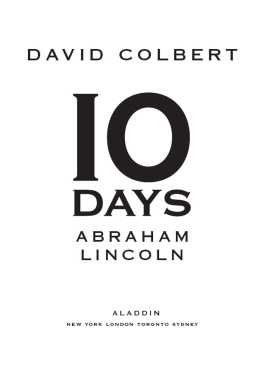
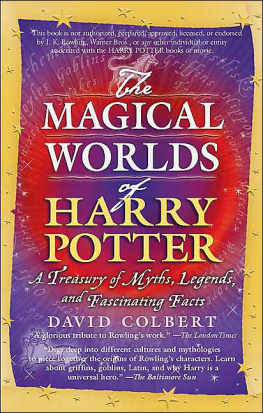
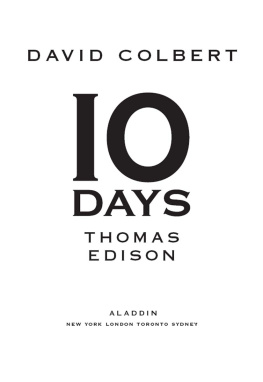
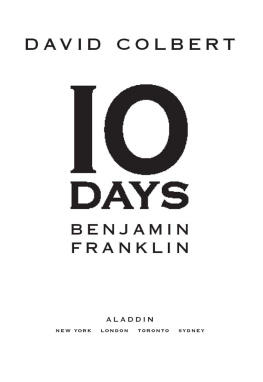
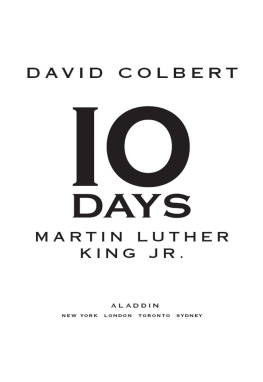
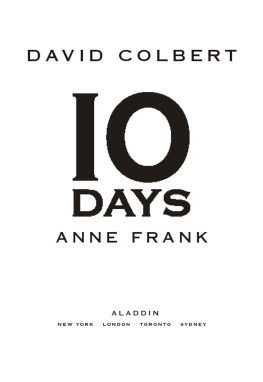
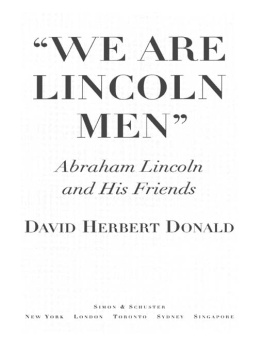
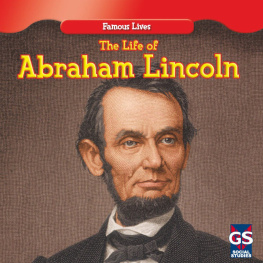


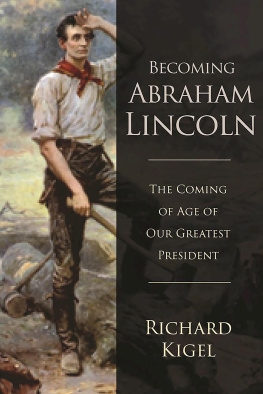
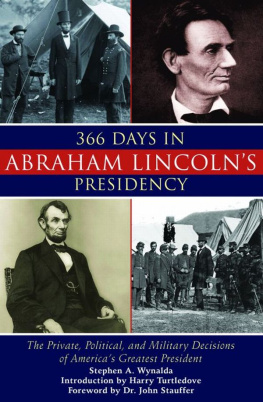
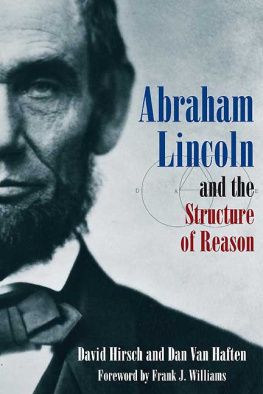

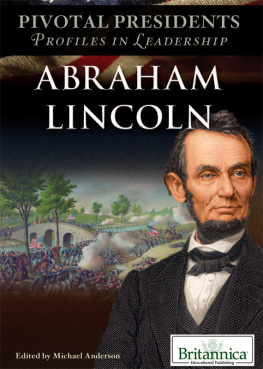
 ALADDIN An imprint of Simon & Schuster Childrens Publishing Division 1230 Avenue of the Americas, New York, NY 10020 Copyright 2009 by David Colbert Thanks to John Chew for his mathematical expertise All illustrations, woodcuts, and photographs courtesy of the Library of Congress All rights reserved, including the right of reproduction in whole or in part in any form. ALADDIN and related logo are registered trademarks of Simon & Schuster, Inc.
ALADDIN An imprint of Simon & Schuster Childrens Publishing Division 1230 Avenue of the Americas, New York, NY 10020 Copyright 2009 by David Colbert Thanks to John Chew for his mathematical expertise All illustrations, woodcuts, and photographs courtesy of the Library of Congress All rights reserved, including the right of reproduction in whole or in part in any form. ALADDIN and related logo are registered trademarks of Simon & Schuster, Inc.










